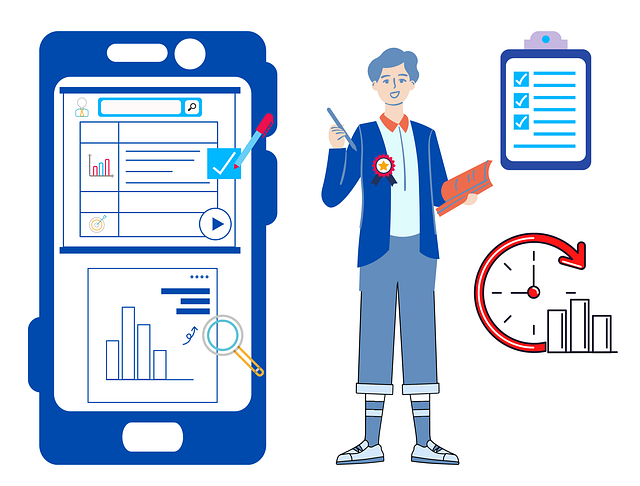AI marketing strategies transform RV repair businesses by streamlining workflows through chatbots and data analytics. Chatbots powered by natural language processing (NLP) handle initial customer interactions, while AI analyzes data to identify common repair issues, enabling proactive problem-solving and personalized service. This approach improves scheduling, inquiry management, and customer satisfaction, positioning RV repair shops for a competitive edge with efficient, 24/7 support. Measuring success through KPIs like first-contact resolution rates and average handle time is crucial for refining AI models based on feedback and vehicle technology advancements.
In today’s digital age, integrating AI into customer service is a game-changer for RV repair businesses. This article explores how AI can revolutionize and enhance service delivery, from streamlining interactions to personalizing experiences. We delve into strategies like leveraging chatbots for quick support, utilizing natural language processing for accurate issue interpretation, and implementing machine learning for predictive maintenance. By embracing AI marketing techniques, RV repair shops can improve workflows, boost customer satisfaction, and stay competitive in a rapidly evolving market.
- Understanding AI's Role in RV Repair Service Enhancement
- Implementing AI for Efficient and Personalized Customer Interactions
- Measuring Success: AI Metrics and Continuous Improvement Strategies for RV Businesses
Understanding AI's Role in RV Repair Service Enhancement

Artificial Intelligence (AI) has emerged as a powerful tool, transforming various industries, and RV repair businesses are no exception. By integrating AI marketing strategies into their customer service, these companies can significantly enhance their workflow efficiency and customer experience. AI offers solutions to streamline processes like scheduling appointments, managing customer inquiries, and providing accurate, personalized recommendations for repairs.
For instance, chatbots powered by AI can handle initial customer interactions, offering quick support and gathering essential information for diagnostic purposes. Natural Language Processing (NLP) enables these chatbots to understand complex queries and provide relevant responses, ensuring customers receive immediate assistance. Moreover, AI-driven data analytics can identify patterns in common repair issues, allowing businesses to proactively address potential problems and optimize their service offerings.
Implementing AI for Efficient and Personalized Customer Interactions

Implementing AI for Efficient and Personalized Customer Interactions
In today’s digital era, AI marketing has become a game-changer for RV repair businesses aiming to enhance their customer service strategies. By integrating artificial intelligence into their workflows, these businesses can achieve efficient and personalized interactions with clients. AI chatbots, for instance, can swiftly handle initial customer inquiries, providing quick responses around the clock without compromising on accuracy. This not only improves customer satisfaction but also allows human agents to focus on more complex issues, thereby optimizing resource allocation.
Furthermore, AI algorithms can analyze vast amounts of customer data to identify patterns and preferences, enabling repair shops to offer tailored solutions. Personalized recommendations for parts replacements or service packages can significantly enhance the customer experience, fostering loyalty and repeat business. With AI-driven marketing strategies, RV repair businesses can transform their operations, ensuring a competitive edge in the market while delivering exceptional customer care.
Measuring Success: AI Metrics and Continuous Improvement Strategies for RV Businesses

Measuring success is a critical aspect of any AI implementation, and RV repair businesses should define key performance indicators (KPIs) to track the effectiveness of their AI customer service strategies. These metrics could include first-contact resolution rates, customer satisfaction scores, and average handle time. By analyzing these data points, businesses can gauge the efficiency and impact of AI on their operations. For instance, a significant increase in successful issue resolution at the first point of contact could indicate that AI is effectively handling simple, repetitive tasks, allowing human agents to focus on more complex repairs.
Continuous improvement is paramount in this rapidly evolving landscape. RV repair businesses should adopt an iterative approach, regularly reviewing and refining their AI models based on customer feedback and performance data. This might involve retraining models with new data to adapt to changing vehicle technologies or updating algorithms to better understand the nuances of RV-specific repairs. Incorporating AI marketing strategies for improving RV repair workflows can lead to enhanced efficiency, reduced wait times, and improved overall customer experience.
AI has the potential to revolutionize RV repair businesses by enhancing customer service and optimizing workflows. By implementing AI strategies, such as personalized interactions and efficient communication channels, these businesses can improve overall customer satisfaction. Measuring success through key performance indicators (KPIs) allows for continuous improvement, ensuring that AI marketing efforts keep up with evolving customer needs. Embracing these innovative solutions can set RV repair companies apart in a competitive market, ultimately driving growth and fostering long-term client relationships.
